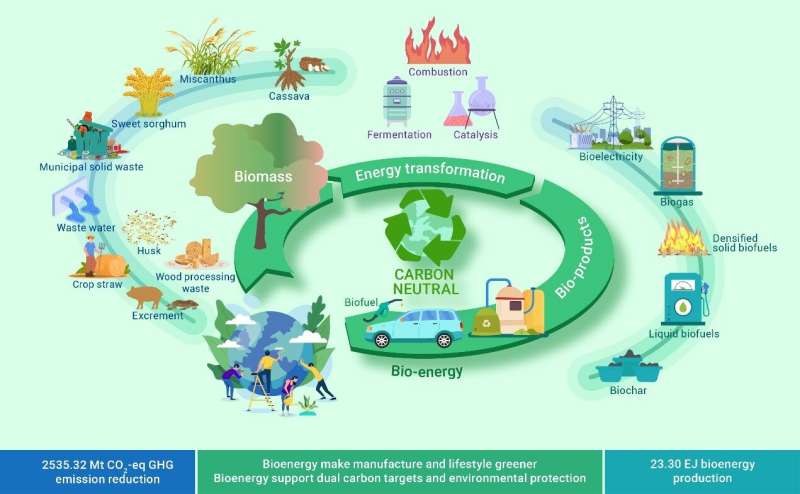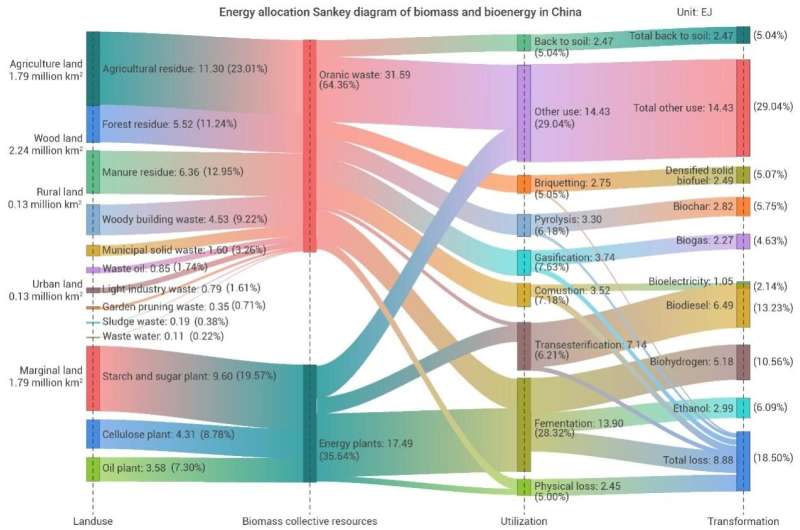Researchers evaluate energy conservation and carbon reduction potential for biomass energy conversion

Biomass energy is a form of solar energy stored in biomass through plant photosynthesis. It is a renewable energy and the only renewable carbon source. China has abundant biomass resources, and previous studies have emphasized biomass resources for potential energy use in China. However, comprehensive analysis of energy conservation and carbon reduction for biomass through multi-source and multi-path energy conversion has not been systematically studied.
A joint research team consisting of Prof. Xi Fengming’s group from the Institute of Applied Ecology of the Chinese Academy of Sciences (CAS), Prof. Fu Jingying’s group from the Institute of Geographic Sciences and Natural Resources Research of CAS, and Prof. Wang Feng’s group from the Dalian Institute of Chemistry and Physics of CAS constructed a comprehensive bioenergy accounting model with a multi-dimensional analysis that combines spatial analysis, life-cycle analysis, and multi-path analysis.
Using the accounting model, the researchers evaluated China’s bioenergy production and carbon emission reduction potentials. The results were published in The Innovation on April 13.
They found that China’s recoverable biomass resources are 49.09 EJ yr-1, mainly from organic waste (63.465%) and energy plants on marginal land (35.64%). Excluding other uses and losses of biomass, the potential for energy use is about 29.73 EJ.
Through efficient energy conversion, clean bioenergy production is 23.30 EJ, accounting for about 19% of China’s total primary energy production. The corresponding carbon reduction potential is 2535.32 Mt CO2-eq, accounting for about 25% of China’s carbon emissions. Prioritizing provinces rich in biomass resources, such as Guangxi, Sichuan, and Jiangsu, could be considered to optimize biomass development.

In addition, attention should also be paid to bioelectricity, as it is an effective substitute for conventional counterparts in terms of energy conservation and emission reduction.
This study reveals the energy conservation and carbon reduction benefits of multi-approach biomass energy utilization toward carbon neutrality, which will provide important data support for the establishment of China’s clean energy structural system and the realization of carbon neutrality goals.
More information:
Jiaoyue Wang et al, Benefit analysis of multi-approach biomass energy utilization toward carbon neutrality, The Innovation (2023). DOI: 10.1016/j.xinn.2023.100423
Citation:
Researchers evaluate energy conservation and carbon reduction potential for biomass energy conversion (2023, May 5)
retrieved 5 May 2023
from https://techxplore.com/news/2023-05-energy-carbon-reduction-potential-biomass.html
This document is subject to copyright. Apart from any fair dealing for the purpose of private study or research, no
part may be reproduced without the written permission. The content is provided for information purposes only.
For all the latest Technology News Click Here
For the latest news and updates, follow us on Google News.

